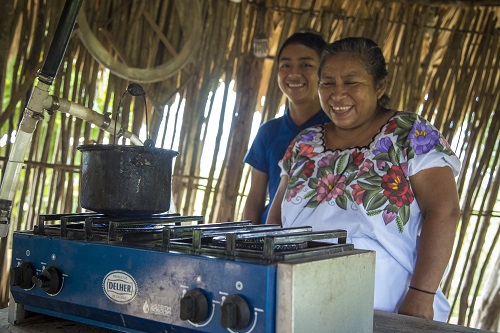
Project Desciption: In rural areas of Yucatán, the main economic activity is agriculture, a sector where women account for 70% of the workforce. They perform their daily work without any basic training, technology, financing and without the rights over the land they cultivate. Climate change has made this problem even worse, making it more difficult to break the cycle of poverty. The goal of this project is to empower women by giving them access to natural resources in their homes through biodigesters, developing skills that improve their farming practices and reduce the risks of respiratory diseases and the time needed for gathering firewood, protecting the forests and stopping the use of chemical fertilisers. For this, 599 biodigesters have been installed in Yucatán’s indigenous communities.
Climate Impact: In 5 years, 432,897 m3 of biogas have been produced, reducing the use of firewood by 88%. Experience showed that manure transformed into energy eliminates a significant amount of CO2. The biodigesters have reduced 7,892 metric tons of animal waste that would have ended up in the aquifer. They produce 37 million litres of biofertiliser a year, for a fertilisation potential of approximately 567 ha/year, the equivalent of replacing 170,000 kg of synthetic fertilisers a year. This figure implies that the use of biofertiliser replaces the use of chemical fertilisers, as well as pesticides.
Gender Impact: Biodigesters, mainly managed by women, provide self-produced inputs that improve harvests and nutrition, breaking the cycle of extreme poverty and malnutrition in a period of climate change. Women participated in trainings and their voices were integrated into the generation of knowledge on climate change, rights and the use of clean energy. The systems adopted reduce the women’s health risks and financial stress and have an impact on energy and food safety, as well as on the diversification of productive farming activities.
Scalibility: The biodigesters can be replicated and are designed for small producers. They are mainly supplied with animal waste and require very little maintenance, helping the women and girls to save time to engage in other activities. The aim is to replicate knowledge through the creation of the first storage and treatment centre, called U ́Ka Muuk’ Lu’um, since 2017. The consolidation of this centre provides knowledge and space for these producers to find the tools for reproducing sustainable agricultural practices.